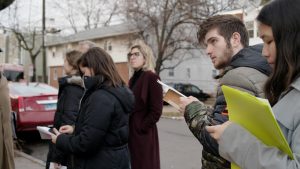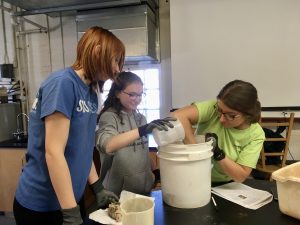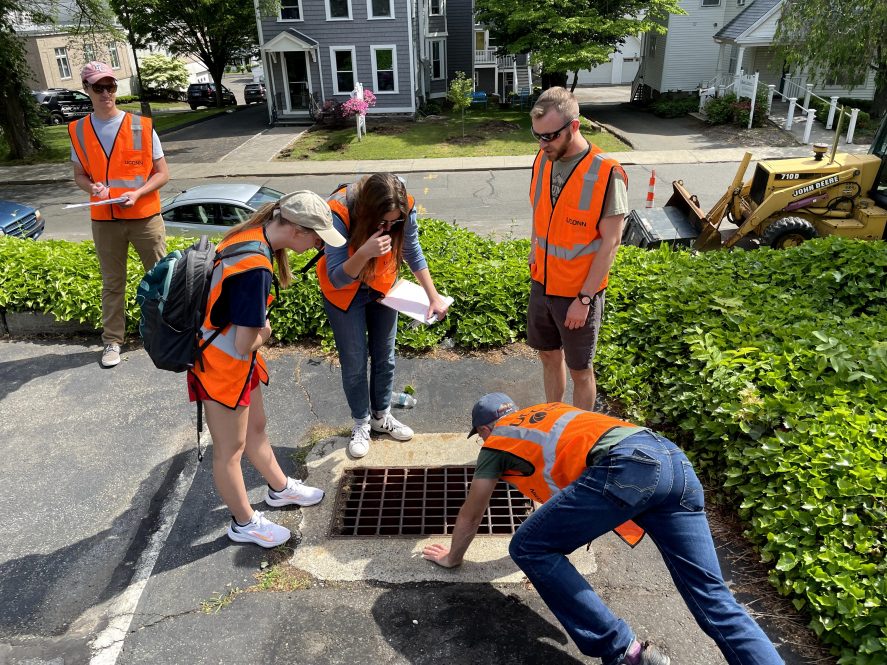Climate change is here, and towns across the state and region are beginning to respond — when they can. When towns can’t start projects for sustainability or climate adaptation, limited resources are often to blame, says Emeritus Extension Educator Chester Arnold, but UConn students are stepping up to help.
Arnold and his colleagues realized there was a “capacity gap” where it was clear that towns want to undertake projects to build resilience, but often don’t have the resources or time to apply for grants or to do the research needed to tackle them. At the same time, students are passionate about issues of sustainability and resilience, but often not aware of how to help inform community-based decisions.

The group of educators, which included faculty from several colleges, realized there was an opportunity to pair trained UConn students with towns and organizations around the state on projects to help build climate resilience. With a seed grant from the Provost’s Office, in 2017 they started a new program called the Climate Corps. From that beginning, the program expanded and now includes the Brownfields Corps led by Marisa Chrysochoou and Nefeli Bompoti of Civil and Environmental Engineering and the Stormwater Corps led by Mike Dietz and David Dickson of UConn Extension, along with the Climate Corps led by Juliana Barrett of Sea Grant Extension, all falling under the umbrella of the Environment Corps (E-Corps). In 2021, E-Corps won the UConn Faculty Team Award for Excellence in Community Engaged Scholarship.
Now in its sixth year, the group recently conducted a survey to evaluate the impact of E-Corps participation on students after graduation, and the report shows promising results. Both the full report and a brief summary can be found on the project website.
The E-Corps program model spans two semesters: the first is hands-on and classroom-based, and then students have the option to pair with a community where they spend the second semester applying and building their skills by completing a project for the town or community partner, says Arnold.
“The focus for the courses is at the local level on how these environmental problems are affecting communities and how they are responding or not responding, and what strategies can be applied. To conduct effective projects, you need to understand not only the science of the problem, but the way things work, and how decisions are made, at the town level. We say that the E-Corps is built on putting together familiar aspects in an unusual way, in that we have a mix of classroom instruction, service learning, and extension outreach.”
E-Corps is now NSF funded via a program aimed at improving undergraduate STEM education and building self-sustaining programs, Arnold says, and they hope this adaptable model can be helpful for those wishing to implement similar initiatives both at UConn and at other institutions,
“We have been assuming that if we build it, they will come and we’re not sure if that’s true, though we do have some colleagues that over the last couple of years have expressed interest in adapting the model to their own areas of expertise.”
The program recently debuted a new section of the website devoted to providing information and assistance to those interested in learning more about the model. The site has syllabi, information on instructional techniques, advice on interacting with towns and choosing projects, and a library of materials.
Judging by testimonials cited in the student impact report, and in speaking with current and recent participants, the program could help many more students if implemented widely.
Aaron Hinze ’24 (CLAS) has helped with technical assistance for the brownfield corps since taking the brownfield course.
“For me, it’s been the most important thing I’ve done at UConn, and it helped me see what I want to do with my future,” Hinze says. “I always knew I wanted to do something in working with the environment, and brownfields and redevelopment of them really impacted me. You see how it can truly have an impact on a community even just something as small as adding a new park, or a new community center as opposed to having a dilapidated building, for example. That’s just one step, one piece of the puzzle, but it really is amazing to see the impact it can have.”
The types of projects students help with include research and assessment for grant applications, projects to help towns comply with stormwater management regulations, developing coastal resilience plans, and performing climate vulnerability assessments, to name just a few. Hinze says that at the outset, some of these projects can feel insurmountable for communities but with some assistance, the solutions are not as complicated as they seem.
Rachael Ruggiero ’23 (CAHNR/CLAS) also says the experience in E-Corps helped her realize what she wanted to do with her degree:
“I found the stormwater class to be one of the best, most informative, and practical classes that I’ve taken. It gave me real-world experience that I can apply and helped me figure out more about my major and what I can do with it.”
After taking all three E-Corps courses, Lilly Adamo ’24 (CAHNR) was excited about the spectrum of majors and variety of perspectives represented by the students who took the course, which she says encouraged fruitful discussions.

“These courses have tremendously impacted my personal and professional growth,” she says. “I think the most impactful part of the course is the exposure to extremely relevant environmental concepts including the integration of equity as well as planning, policy, etc. The ability to work directly with towns is invaluable and offers an avenue to interact with industry experts and relevant professionals which is fantastic for career development and making connections.”
The impact report is based on 70 survey responses received from UConn graduates who had taken at least one E-Corps course, in addition to the results of 12 follow-up interviews. It cites five key findings including significant impacts on knowledge and professional skills for graduates, that E-Corps graduates tend to pursue advanced degrees or careers in environmental fields, and that the program has influenced their interests in addressing environmental concerns as citizens.
“A lot of our students enter the environmental field because they are interested in societal good, and these courses are often their first opportunity for them to have this experience as part of their college studies,” says Chrysochoou. “As a land grant university, it is in our DNA to foster these direct connections with the local communities.”
There is now a parallel study being done to capture the impacts the program has had on the communities and organizations that have partnered with the program. Research on the model is also being conducted by faculty at the Neag School of Education.
“Our goal is for students to do projects that are useful and actionable for towns,” says Arnold. “I think we’ve largely been very successful at that, it’s all power to the students. They’ve done some great projects, and this is why we say it’s not only life-transformative education but also oriented toward workforce development.”
Ruggiero adds, “I would just say that students should take the class, even if they’re not sure what they want to do. I found it so valuable and want more people to know about it because if I didn’t take these courses, I wouldn’t have had the internship or knowledge I have now.”
The Environment Corps is supported by the University of Connecticut, private donors, and a grant from the National Science Foundation Division of Undergraduate Education/Improving Undergraduate STEM Education (IUSE) Program, Award #1915100. Project partners include CAHNR, SoE, Neag, CLAS and the Office of the Provost.



